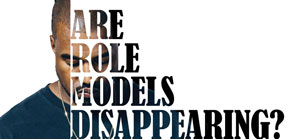Reducing the Role
A change in culture nationally has lead to a shift in who young adults and children view as model citizens.
More stories from Abigail Ellsworth

Growing up, it is important to have at least one role model to look up to, but it seems as time passes positive role models become harder to find. This is very evident due to what generations see in media images and on social media.
According to Merriam Webster, a role model is someone whose behavior, example, or success is or can be emulated by others, especially by younger people. It is important to feel like there are people to look up to as well as having someone help guide young adults in some of life’s obstacles they will soon face at one point in life. There are many people for young adults to choose to have as their role models whether it is celebrities, parents or teachers, there can always be someone to look up to and find help.
“I feel as if role models never disappear, leaving merely the paths of improvement or degradation,” senior Grant Ellingsworth said. “Although, yes, we are presented with a reasonable extent of positive role models, such as our teachers, potentially hopefully parents, and well the rest are far too specific for valid mention.”
Television, social media, hearing things on the radio, and making new friends will start to have an effect on who they will soon start to look up too. Social media and television can have a huge impact on young adults and who they choose to be their role model. Famous celebrities such as Kim Kardashian, Justin Bieber, Miley Cyrus and Kanye West are all a part of 2015’s top celebrities, according to People magazine.
“We are bombarded with negative role models. It may be all too typical to turn to media as an example in such a situation, but our media is irrefutably flooded with negative influences; be these influences originate from individuals, such as celebrities, politicians, and people from organizations,” Ellingsworth said. “[Role models] are unarguably present. I also feel that it is nearly an aspect of the human condition to focus on the negative an unfortunate condition at best, despite our conscious aspirations for the positive. The consistent negative skew on our society being the driving force behind the aforementioned bombardment of negative influences. Essentially, I feel that our role models are getting worse because that is primarily what we are being exposed to as a society.”
It seems as if more and more people are blaming the media due to so many young adults who grew up with watching and seeing what is put out on it.
“I think young adults do often look to celebrities, especially musicians and actors, as role models,” English teacher Andrew Van Herik said. “They see what is cool in how these people dress and how they speak. Some adolescents see this culture and fight it by trying to be different from it. Others try desperately to fit into it. But ultimately adolescents are constantly looking for their identities, so it makes sense that the people who they spend a lot of time listening to and watching impact those identities.”
Parents seem to be their children’s first role model. As children, parents try to teach right from wrong, honesty, respect and education. Once children start to grow older they become more open to the outside world seeing more and more things. For some, however, their parents weren’t their role models. Instead, they’ve sought out new personal experiences to guide them.
“Parents can be good and bad role models,” junior Ricky Brown said. “Personally, I say bad because teens should be able to make their own decisions. I feel that if you have a parent that you are trying to be too much like then you wont try to be you and that can effect their personality and change the person and who they should be.”
When looking for a good role model, keep in mind it is always good to look for people who bring good to the world, rather than someone who creates drama for a good story.
